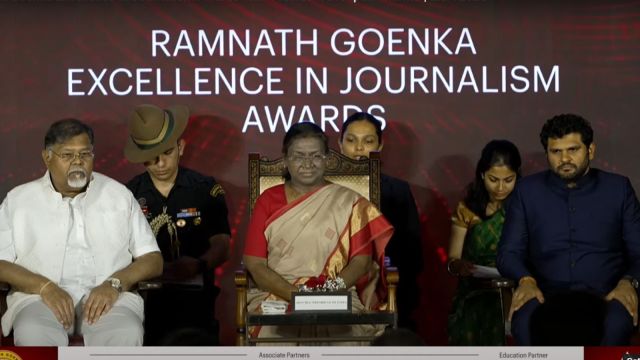Stay updated with the latest - Click here to follow us on Instagram
Ramnath Goenka Awards for Excellence in Journalism | President Murmu says journalism based on human values is ‘not going to be extinct ever’
Ramnath Goenka Awards 2025: President Droupadi Murmu talked about the importance of a vibrant newsroom filled with ideas and the need to strengthen ground reporting.
 Ramnath Goenka Awards: President Droupadi Murmu with Viveck Goenka and Anant Goenka.
Ramnath Goenka Awards: President Droupadi Murmu with Viveck Goenka and Anant Goenka.President Droupadi Murmu spoke about the critical role of free and fair journalism in sustaining democracy while addressing the Ramnath Goenka Excellence in Journalism Awards ceremony on Tuesday. She paid tribute to Ramnath Goenka, the founder of the Indian Express group, praising his commitment to press freedom and public service, especially during the Emergency.
In her address, President Murmu reflected on Ramnath Goenka’s unwavering dedication to journalistic integrity and service to the nation. She recounted how Goenka’s bold stance during the Emergency, including the symbolic blank editorial published by The Indian Express, became a beacon of hope for restoring democratic rights.
“His newspaper refused to buckle during the Emergency. The blank editorial it published became a telling symbol of a free press as well as a sign of hope for the restoration of democratic rights. Goenka-ji’s audacity was guided by the values he must have learned from our freedom movement,” President Murmu said, addressing the audience at the Ramnath Goenka Awards.
She also noted his association with Mahatma Gandhi, citing instances where Ramnath Goenka actively supported the Mahatma’s initiatives, including contributing towards Harijan upliftment.
“In 1933, at a function where Gandhiji was collecting funds for Harijan upliftment, in the first bid for a casket worth Rs 15 Goenka-ji stepped forward with a bid of Rs 100. In 1935, when Gandhiji was re-elected as president of the Hindi Sahitya Sammelan, he said this honour must have been due to his work of spreading Hindi in the South. He then named Shri Ramnath Goenka as one of the “custodians” of that mission,” she added.
Highlighting Gandhi’s perspective on journalism, President Murmu quoted him, stating, “The sole aim of journalism should be service.” She said Ramnath Goenka embodied this philosophy by ensuring that his journalism always served the people.
The President also talked about the importance of a vibrant newsroom filled with ideas and the need to strengthen ground reporting. She referenced former President Dr APJ Abdul Kalam’s call for establishing a research wing within newsrooms to ensure accuracy and quality.
Acknowledging The Indian Express for maintaining a strong research team, she urged news organisations to invest more resources in field reporting, adding that “news gathering is the soul of journalism.”
Addressing the changing landscape of media funding, President Murmu highlighted the difficulties in sustaining a reader-centric business model. She observed that while state and corporate funding had their advantages and limitations, keeping readers at the centre was the most preferable option.
However, she acknowledged the challenges in maintaining this model, urging stakeholders to create more awareness about the need for responsible journalism. “Profitability and responsibility to the reader are not mutually exclusive,” she added.
President Murmu also expressed concern about the impact of artificial intelligence (AI) and deepfakes on journalism, warning that malicious content and post-truth narratives could undermine public trust. She said there is a need for proactive campaigns to educate citizens, particularly the youth, about identifying bias and misinformation in news.
“Developing critical faculties among young minds is indispensable for the nation’s future,” she asserted.
While acknowledging AI’s growing role in content creation, President Murmu highlighted the irreplaceable value of human empathy in journalism. She cautioned that although machines could compile and edit reports, they lacked the emotional depth and understanding that journalists bring to their work.
“The day might not be far when they would be able to carry out most of the work of journalists. What they lack, however, is empathy, which will be the one ingredient that can help journalists beat AI. Journalism based on human values is not going to be extinct ever,” she remarked.
Congratulating the award winners, President Murmu praised their work for reflecting human values and amplifying the voices of the marginalised.
“The work of today’s award winners is characterised by such human values in one way or the other. It highlights their concern for fellow citizens and for those who are not in a position to speak for themselves,” she said.
She also commended the inclusion of awards for journalism in regional languages, stressing that it would encourage more ground reports from remote regions, thus enriching Indian journalism.
The President concluded by acknowledging the contribution of the Ramnath Goenka Awards in setting higher standards for Indian journalism.
“These awards have strengthened the roots of our democracy by encouraging journalism that matters,” she said, extending her best wishes to the media fraternity.
Ramnath Goenka Excellence in Journalism Awards winners list (27 winners)
| S.No. | Award Category | Full Name | Publication/ Channel | P/D/B | Winning Story |
| 1. | Hindi | Mridulika Jha | Aaj Tak | Print/ Digital | For her story mapping the treacherous ‘Dunki route’ that young people take out of villages in Haryana to get to the US |
| 2. | Regional Languages | Jisha Elizabeth | Madhyamam | Print/ Digital | For her chilling story on how Thailand-based human traffickers recruited three Indian youths. Transported to Myanmar by cybercrime gangs, the youths were forced to work as scammers, subjected to brutal torture and witnessed horrific acts of violence against their fellow workers. |
| 3. | Environment, Science and Technology Reporting | Sibu Kumar Tripathi | India Today | Print/ Digital | For his series on Joshimath, where rapid infrastructure development, hydroelectric projects and a population boom led to the area’s destabilisation and its sinking crisis |
| 4. | Uncovering India Invisible | Satyasundar Barik | The Hindu | Print4 | For his series of stories on moving and migration – from the missing daughters of Odisha’s border villages, to how descendants of Bengali Hindu immigrant families from erstwhile thrived in Odisha’s Nabarangpur. |
| 5. | Business & Economic Journalism | Twesh Mishra | The Economic Times | For his story on how the government’s flagship programme to boost local manufacturing of EVs in India was being flouted by makers, who were importing components and using fake documents to receive subsidies worth over Rs 400 crore. | |
| 6. | Reporting on Politics And Government | Maitri Porecha | The Hindu | For her detailed accounts after the Balasore train tragedy — from the heart-wrenching tale of how Aadhaar was used to identify a patient to how DNA testing for over 50 bodies had been hit due to non-retrieval of proper samples | |
| 7. | Sports Journalism | Shahab Ali, Amarnath Kashyap | Hindustan | For their exposé on gold medallist Asha Kiran Barla’s village, Navadih in Jharkhand, which lacked even the most basic of amenities — clean drinking water. Their story spurred the local district administration to take immediate corrective steps. | |
| 8. | Investigative Reporting | Nihal AP Koshie, Mahender Singh Manral, Mihir Vasavda | The Indian Express | For their stories on the protests and events that followed after Brij Bhushan Sharan Singh, the face of India’s wrestling federation, was charged for sexual harassment. | |
| 9. | Feature Writing | Shubhajit Roy | The Indian Express | For his ground reports from Israel — from the Gaza border to the Palestinian territory of West Bank — on the searing pain felt by the locals on seeing their home under attack, and tales of death and destruction all around. | |
| 10. | Foreign Correspondent Covering India | Nilesh Christopher | Rest of World | Print/ Digital | For his stories on the societal impact of two of the biggest talking points — AI and the shift in manufacturing away from China. For using forensic analysis and AI reporting to debunk a politician’s claim, and for using the Foxconn experience to highlight the consequence of replicating Chinese-style manufacturing in India. |
| 11. | Prakash Kardaley Memorial Award for Civic Journalism | Jeet Mashru, Somita Pal | Hindustan Times | For their story on how a shortage in BMC-run hospitals in Mumbai forced patients to buy even basic supplies from pharmacies outside. Their impactful story — and a subsequent government probe — led to the civic body introducing a new ‘Zero Prescription Policy’. | |
| 12. | Photo Journalism | P. Ravikumar | The New Indian Express | For his haunting photographs that captured the devastation after a massive oil spill in a north Chennai river due to Cyclone Michaung. | |
| 13. | Books (Non-Fiction) | A.R. Venkatachalapathy | Penguin Random House | For his book on a small port town lawyer named V. O. Chidambaram Pillai, whose novel idea challenged the very might of the British empire. |
Broadcast
| 1. | Hindi | Siddhant Mohan | The Lallantop | Broadcast/ Digital |
For his ground report on the real Kerala story — away from the simplistic narratives offered by a feature film. |
| 2. | Regional Languages | Mandar Gonjari | ABP Majha | Broadcast | For his stories on how an undertrial ran a successful synthetic drug racket — from his bed in Pune’s Sassoon General Hospital |
| 3. | Environment, Science & Technology | Joel Michael, Rohini Krishnamurthy | Down To Earth | Broadcast/ Digital | For their story on deadly industrial pollution in Punjab — how 11 persons dropped dead in 15 minutes due to a gas leak from open sewers in Ludhiana’s Giaspura in April 2023. |
| 4. | Uncovering India Invisible | Vishnukant Tiwari, Athar Rather | The Quint | Broadcast/ Digital | For their three-part series on how women were tortured, paraded naked and ultimately killed in interior Jharkhand — in the name of witchcraft. |
| 5. | Politics and Government | Ashutosh Mishra | India Today TV | Broadcast | For his ground reports on ethnic violence in Manipur — from getting caught in the crossfire to being hostage for a few hours, from government statements to stories from ground zero. |
| 6. | Sports Journalism | Tejas Vaidya, Enakshi Rajvanshi | BBC Hindi | Broadcast/ Digital | For their inspiring story on how disabled women cricketers from Gujarat are gaining a new identity and self-confidence through the sport despite the lack of institutional support. |
| 7. | Investigative Reporting | Anurag Dwary | NDTV | Broadcast | For his investigation into a medical college scam across Madhya Pradesh — how these schools were run in tiny rooms, had sub-par training standards and how there were no exams for students for years. |







